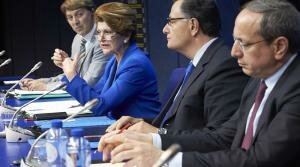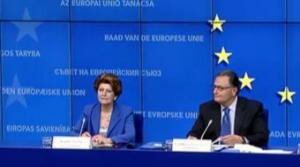- EYCSEducation, Youth, Culture & Sport (EYCS)
Cultural heritage and Sports institutions discussed at EYCS Council in Brussels
Important decisions on cultural heritage and sports institutions were taken at a Council of Culture and Sports Ministers of the European Union, chaired by Greek Minister of Culture and Sports, Panos Panagiotopoulos, in Brussels, on 21 May 2014.
The enhancement of cultural heritage as a valuable tool for promoting economic growth in European countries and strengthening social cohesion, was one of the main issues of the Council of Culture Ministers.
Ministers of Culture of the Member States for the first time adopted conclusions entirely devoted to cultural heritage, as a strategic resource for a sustainable Europe. The conclusions highlight the essential role of heritage in economic development and social cohesion, particularly in a period of economic crisis, which is affecting the whole of Europe.
Discussion also took place on the Next Work Plan for Culture beyond 2014. Following the evaluation of the current one, undertaken by the Greek Presidency, Ministers had the opportunity to express their views on the cultural policy challenges nowadays and the way the new Work Plan for Culture can address these challenges.
The need to support new models of financing culture, synergies between the public and private sectors, and the need to promote access to cultural content with the help of new digital media were discussed in the public debate of the Ministers.
Furthermore, the Commission briefed the Council on the current state of negotiations on the Transatlantic Partnership of trade and investment between the European Union and the United States of America.
The Culture Council unanimously adopted the decision on the designation of Leewarden in Netherlands as a European Capital of Culture for the year 2018, as well as the decision on the practical and procedural arrangements for the appointment by the Council of three members of the selection and monitoring panel for the Cultural Capitals of Europe in the period 2020-2033.
Moreover, the Sports Ministers of the Member States for the first time adopted Council Conclusions on Gender equality in sport, a fundamental principle of the European Union, which should be supported and preserved.
In addition, Sports Ministers adopted the Resolution on the Work Plan in the field of sport for the next three years (2014 - 2017) and had a public debate on the economic, social and environmental sustainability of major sports events.
Member States agreed that the future work plan should focus on integrity in sports, the economic dimension of sport and the connection between sports and society.
The Greek Minister stated during the Council meeting: “The elections next Sunday are the most critical in the history of the European Union. One of the reasons is the representation in these elections of anti-European ideas. Culture is one of the weapons that our common past gives to us against these ideas, both for the present and for our future."
Read more here.









